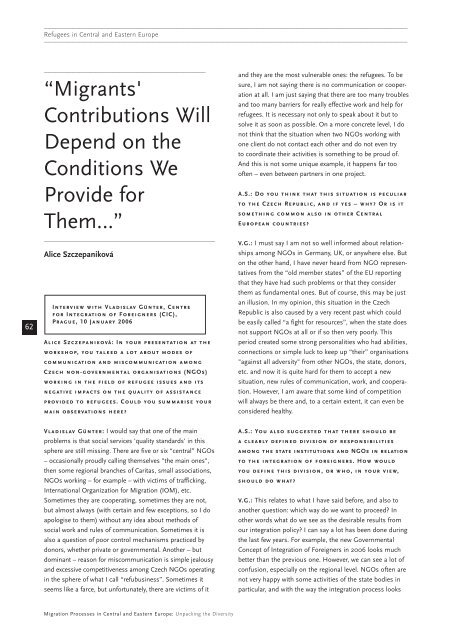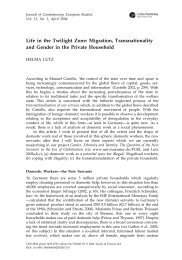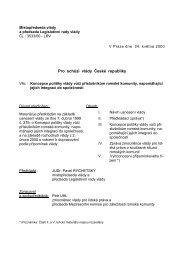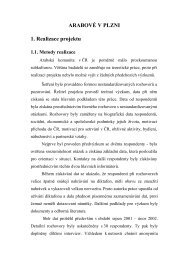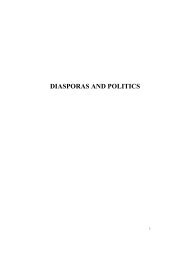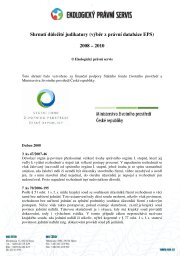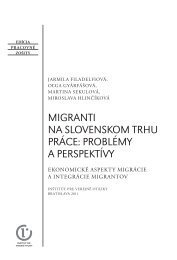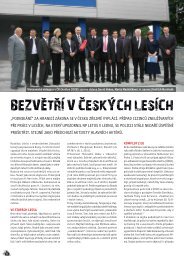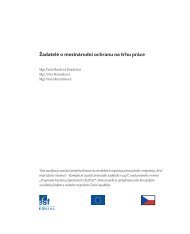Migration Processes in Central and Eastern Europe - Multiple Choices
Migration Processes in Central and Eastern Europe - Multiple Choices
Migration Processes in Central and Eastern Europe - Multiple Choices
You also want an ePaper? Increase the reach of your titles
YUMPU automatically turns print PDFs into web optimized ePapers that Google loves.
———————————————————————————————————————————————————————————————<br />
Refugees <strong>in</strong> <strong>Central</strong> <strong>and</strong> <strong>Eastern</strong> <strong>Europe</strong><br />
———————————————————————————————————————————————————————————————<br />
62<br />
————————————————————————————<br />
“Migrants'<br />
Contributions Will<br />
Depend on the<br />
Conditions We<br />
Provide for<br />
Them…”<br />
—————————————————————————————<br />
Alice Szczepaniková<br />
Interview with Vladislav Günter, Centre<br />
for Integration of Foreigners (CIC),<br />
Prague, 10 January 2006<br />
Alice Szczepaniková: In your presentation at the<br />
workshop, you talked a lot about modes of<br />
communication <strong>and</strong> miscommunication among<br />
Czech non-governmental organisations (NGOs)<br />
work<strong>in</strong>g <strong>in</strong> the field of refugee issues <strong>and</strong> its<br />
negative impacts on the quality of assistance<br />
provided to refugees. Could you summarise your<br />
ma<strong>in</strong> observations here?<br />
<strong>and</strong> they are the most vulnerable ones: the refugees. To be<br />
sure, I am not say<strong>in</strong>g there is no communication or cooperation<br />
at all. I am just say<strong>in</strong>g that there are too many troubles<br />
<strong>and</strong> too many barriers for really effective work <strong>and</strong> help for<br />
refugees. It is necessary not only to speak about it but to<br />
solve it as soon as possible. On a more concrete level, I do<br />
not th<strong>in</strong>k that the situation when two NGOs work<strong>in</strong>g with<br />
one client do not contact each other <strong>and</strong> do not even try<br />
to coord<strong>in</strong>ate their activities is someth<strong>in</strong>g to be proud of.<br />
And this is not some unique example, it happens far too<br />
often – even between partners <strong>in</strong> one project.<br />
A.S.: Do you th<strong>in</strong>k that this situation is peculiar<br />
to the Czech Republic, <strong>and</strong> if yes – why? Or is it<br />
someth<strong>in</strong>g common also <strong>in</strong> other <strong>Central</strong><br />
<strong>Europe</strong>an countries?<br />
V.G.: I must say I am not so well <strong>in</strong>formed about relationships<br />
among NGOs <strong>in</strong> Germany, UK, or anywhere else. But<br />
on the other h<strong>and</strong>, I have never heard from NGO representatives<br />
from the “old member states” of the EU report<strong>in</strong>g<br />
that they have had such problems or that they consider<br />
them as fundamental ones. But of course, this may be just<br />
an illusion. In my op<strong>in</strong>ion, this situation <strong>in</strong> the Czech<br />
Republic is also caused by a very recent past which could<br />
be easily called “a fight for resources”, when the state does<br />
not support NGOs at all or if so then very poorly. This<br />
period created some strong personalities who had abilities,<br />
connections or simple luck to keep up “their” organisations<br />
"aga<strong>in</strong>st all adversity" from other NGOs, the state, donors,<br />
etc. <strong>and</strong> now it is quite hard for them to accept a new<br />
situation, new rules of communication, work, <strong>and</strong> cooperation.<br />
However, I am aware that some k<strong>in</strong>d of competition<br />
will always be there <strong>and</strong>, to a certa<strong>in</strong> extent, it can even be<br />
considered healthy.<br />
Vladislav Günter: I would say that one of the ma<strong>in</strong><br />
problems is that social services 'quality st<strong>and</strong>ards' <strong>in</strong> this<br />
sphere are still miss<strong>in</strong>g. There are five or six “central” NGOs<br />
– occasionally proudly call<strong>in</strong>g themselves "the ma<strong>in</strong> ones",<br />
then some regional branches of Caritas, small associations,<br />
NGOs work<strong>in</strong>g – for example – with victims of traffick<strong>in</strong>g,<br />
International Organization for <strong>Migration</strong> (IOM), etc.<br />
Sometimes they are cooperat<strong>in</strong>g, sometimes they are not,<br />
but almost always (with certa<strong>in</strong> <strong>and</strong> few exceptions, so I do<br />
apologise to them) without any idea about methods of<br />
social work <strong>and</strong> rules of communication. Sometimes it is<br />
also a question of poor control mechanisms practiced by<br />
donors, whether private or governmental. Another – but<br />
dom<strong>in</strong>ant – reason for miscommunication is simple jealousy<br />
<strong>and</strong> excessive competitiveness among Czech NGOs operat<strong>in</strong>g<br />
<strong>in</strong> the sphere of what I call “refubus<strong>in</strong>ess”. Sometimes it<br />
seems like a farce, but unfortunately, there are victims of it<br />
A.S.: You also suggested that there should be<br />
a clearly def<strong>in</strong>ed division of responsibilities<br />
among the state <strong>in</strong>stitutions <strong>and</strong> NGOs <strong>in</strong> relation<br />
to the <strong>in</strong>tegration of foreigners. How would<br />
you def<strong>in</strong>e this division, or who, <strong>in</strong> your view,<br />
should do what?<br />
V.G.: This relates to what I have said before, <strong>and</strong> also to<br />
another question: which way do we want to proceed? In<br />
other words what do we see as the desirable results from<br />
our <strong>in</strong>tegration policy? I can say a lot has been done dur<strong>in</strong>g<br />
the last few years. For example, the new Governmental<br />
Concept of Integration of Foreigners <strong>in</strong> 2006 looks much<br />
better than the previous one. However, we can see a lot of<br />
confusion, especially on the regional level. NGOs often are<br />
not very happy with some activities of the state bodies <strong>in</strong><br />
particular, <strong>and</strong> with the way the <strong>in</strong>tegration process looks<br />
<strong>Migration</strong> <strong>Processes</strong> <strong>in</strong> <strong>Central</strong> <strong>and</strong> <strong>Eastern</strong> <strong>Europe</strong>: Unpack<strong>in</strong>g the Diversity


